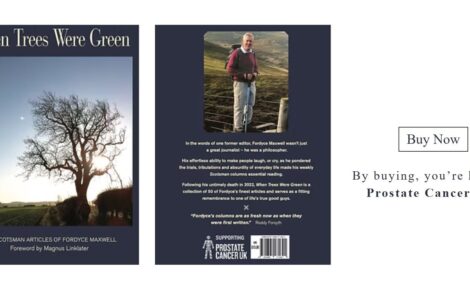



Brexit Survey Shows Ongoing Uncertainty is Eroding Confidence Levels in Scottish Agriculture
SCOTLAND, UK - Ongoing uncertainty around the Brexit process and a lack of clarity and direction on future policy and funding is eroding the confidence of Scotland’s farmers and crofters.The results of a Brexit confidence survey, launched by NFU Scotland in mid-May, were released on Thursday 20 June, the first day of the 2019 Royal Highland Show - a date that marks almost three years since the historic referendum on membership of the European Union on 23 June 2016.
The survey provides a stark picture of confidence levels within the agricultural industry and provides the Union with a stronger, clearer mandate on lobbying priorities as it continues to negotiate on Brexit, funding and a new agricultural policy for Scotland in the future.
In a week when a Scottish Government poll saw 90 percent of the Scottish public recognise that farming is vital to economic growth, the Union has warned that there would be far-reaching consequences for the delivery of goods in the national interest were farming allowed to slip into Brexit-induced decline.
At close of play on Monday (17 June), the Union had received 689 responses – roughly ten percent of its membership and the largest response rate to a member survey in recent NFU Scotland history.
The headline figures from the survey are:
- 74 percent of members haven’t undertaken any business planning around Brexit;
- Taking 'no deal' out of the equation, 11 percent of members think that a Brexit deal would have a 'positive' or 'very positive' impact on their business and 55 percent think it will be 'negative' or 'very negative';
- 11 percent of members say a 'no deal' Brexit would have a 'positive' or 'very positive' impact on their business and 64 percent view it as 'negative' or 'very negative';
- 45 percent have already experienced Brexit-related impacts (direct and indirect) since the referendum – of that, the main issues have been increased costs of inputs (54 percent); putting off new investments (51 percent); putting off expansion in the business (35 percent) and difficulty in recruiting and/or retaining staff (12 percent);
- After Brexit, members anticipate increased cost in inputs (77 percent); difficulty with exports (51 percent); difficulty with importing inputs (38 percent); putting off new investments (38 percent) and expansion (30 percent); difficulty in agreeing future contracts (20 percent) and difficulty in recruiting and/or retaining staff (22 percent);
- 36 percent have considered additional or alternative farming or non-farming enterprises purely as a result of Brexit; and
- 65 percent have some degree of confidence about their business longevity after Brexit while 35 percent have low or no confidence.
Speaking at the launch of the survey results, NFU Scotland President Andrew McCornick said: "Three years of frustrating to-ing and fro-ing on Brexit, with no clear political outcome or direction, have deeply eroded confidence at farm and croft level and left many of our members in a hole that is not of their making.
"The deep-rooted uncertainty around the whole Brexit process is reflected in the alarming number of Scottish farmers and crofters who have yet to undertake any business planning in connection with Brexit.
"Unsurprisingly, most respondents are negative or very negative about post-Brexit farming or crofting in Scotland, regardless of whether we leave the EU with or without a deal. The negativity jumps significantly in the event of a 'no deal'.
"Brexit has already had an impact on many businesses through increased costs and the postponement of planned new investments while respondents are budgeting for a significant increase in input costs post-Brexit. Many have had difficulty recruiting staff and a greater percentage expect that to become even more difficult post-Brexit.
"It is a tribute to the resilience of our agricultural sector that a significant majority continue to see their future in farming and crofting. That said, one in three have little or no confidence about business longevity post-Brexit and that must set alarm bells ringing at both Westminster and Holyrood.
"Low confidence levels have clear implications for our future ambitions around growing our food and drink sector, protecting rural economies and meeting ever-demanding environmental standards.
"In a week when a Scottish Government poll saw 90 percent of the Scottish public recognise that farming is vital to economic growth, there would be far-reaching consequences for the delivery of goods in the national interest were farming allowed to slip into decline.
"The results give us a clear mandate to drive forward with our lobbying priorities. Alongside other UK farming Unions and key Scottish stakeholders, a ‘no deal’ Brexit remains the worst-case scenario for Scottish food and farming and politicians must commit to securing a future arrangement that delivers free and frictionless trade with the EU.
"For some of our specialist, successful and innovative sectors, access to non-UK labour has already bitten into their businesses with some crops going unpicked in 2018. They are steeling themselves for labour issues to get worse in the future, making access to seasonal and permanent, highly skilled or low skilled staff vital for the whole Scottish rural economy.
"And finally, we need direction on policy and a commitment to future funding. Scottish Government and Westminster must wake up to the fact that people are making business decisions in a vacuum.
"NFU Scotland is committed to making Scottish agriculture productive and profitable. Our political engagement on this issue has never been higher and we will continue to drive our case. Farmers and crofters are naturally optimistic and resilient and believe in a long-term future, but the results of this survey clearly illustrate that both parliaments must deliver their part of the deal if confidence levels are to recover."
TheCattleSite News Desk


